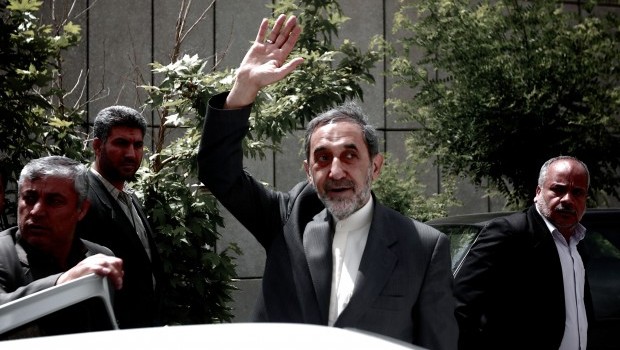
Advisor to the supreme leader Ayatollah Ali Khamenei and hopeful conservative presidential candidate, Ali Akbar Velayati (C) waves as he leaves after a campaign rally in Tehran on June 2, 2013 (AFP PHOTO/BEHROUZ MEHRI)
The spokesman for a coalition of reformists announced they had formed a working group to attempt to foster a coalition between presidential candidates Mohammad Reza Aref and Hassan Rouhani.
Mohammad Ali Najafi said that his group believes a single candidate representing the country’s reformists would have a better chance of winning in the upcoming presidential election on June 14.
However, the reformist presidential candidate Mohammad Reza Aref told Mehr News Agency that he does not have any intention of forming a coalition with Hassan Rouhani.
“I would not form a coalition, and will stay in the presidential election race until the end,” said Aref, a former first vice president in the administration of the reformist president Mohammad Khatami.
Hassan Rouhani, the director of the Strategic Research Center of the Expediency Council, also stated last week that he would stay in the election until the end and will not drop out in favor of another candidate.
Though not an avowed member of the reformist camp, he is also a well-known figure from the Khatami era, in which he served as Iran’s chief nuclear negotiator. He is regarded as a moderate centrist in terms of his domestic and international policy.
Najafi said the working group will try to convince the two candidates to form a coalition, saying: “The results of the negotiations of the seven-member working group will be announced by Saturday June 8, 2013.”
Meanwhile, among the more conservative candidates, the presidential candidate Ali Akbar Velayati announced that members of the so-called Coalition of Three have also agreed to remain in the race, and will not pool their efforts to elect a single candidate from among their ranks.
Velayati, a former foreign minister, told a press conference in Tehran last week that he, along with fellow conservatives Mohammad Baqer Qalibaf, Tehran’s mayor, and lawmaker Gholam-Ali Haddad-Adel, no longer believed it necessary for two of them to drop out to rally conservatives behind a single figure.
In other news, another candidate, Mohsen Rezaei, told Iran’s Shargh newspaper that he would “interact with the Supreme Leader” to reduce the role of firms associated with the Iranian Revolutionary Guard Corps (IRGC) in the Iranian economy.
Rezaei made his comments despite the fact that he is a former commander of the IRGC. He holds a doctorate in economics, and has previously blamed government mismanagement for many of Iran’s economic problems.
“[The] IRGC must intervene in the economy of the country in special occasions,” he told reporters. “After the revolution, the private sector in Iran was dead. IRGC involvement in the economy revived the economy. Now, the economy must be more under the control of the administration.”
